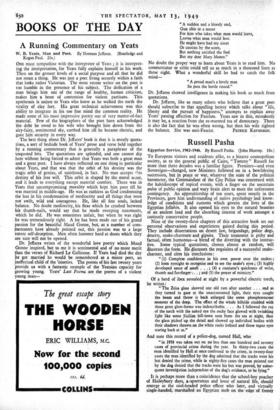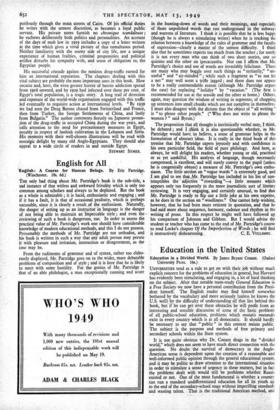Russell Pasha
Egyptian Service, 1902-1946. By Russell Pasha. (John Murray. 18s.) To European visitors and residents alike, to a bizarre cosmopolitan society, as to the general public of Cairo, " Tommy " Russell for more than three decades was a familiar figure. Premiers—and even Sovereigns—changed, new Ministers followed on in a bewildering succession, but in peace or war, whatever the state of the political barometer, the Commandant of the City Police was concerned with the kaleidoscope of topical events, with a finger on the uncertain pulse of public opinion and wary brain alert to meet the unforeseen contingency. An apprenticeship of ten years, spent mostly in the Provinces, gave him understanding of native psychology and know- ledge of conditions and customs which govern the lives of the Egyptian fellahin. It also opened his eyes to the natural beauties of an ancient land and the absorbing interest of work amongst a curiously conservative people.
Nine of the twenty-three chapters of this attractive book set out personal observations and experiences gained during this period. They include dissertations on desert law, brigandage, police dogs, deserts, snake-charmers and gipsies. Their treatment is pithy and factual, often humorous—a blend of the diverting with the instruc- tive. Some typical quotations, chosen almost at random, will illustrate the form. He discusses the requisites of a successful snake- Charmer, and cites his conclusions: "(1) Complete confidence in his own power over the snakes ; (2) keen eyesight to recognise and to see the snake's eyes ; (3) highly developed sense of smell . . . ; (4) a conjuror's quickness of wrist, thumb and forefinger-. . ; and (5) the power of mimicry."
Of a herd of ibex revealed at night by a powerful electric torch, he writes : "The Zeiss glass showed one old ram after another . . . and as they turned to gaze at the unaccustomed light, their eyes caught the beam and threw it back enlarged like some phosphorescent monster of the deep. The effect of the whole hillside studded with these great glow-forms was- indescribable. . . . As I followed the ray of the torch with the naked eye the rocky face glowed with twinkling light like some Sicilian hill-town seen from the sea at night, then the glass picked up the detail and showed up individual bodies with their shadows thrown on the white rocks behind and those topaz eyes staring back at us."
And note this record of a police-dog, named Hall, who
"in 1938 was taken out on no less than one hundred and seventy cases of provincial crime during the year. In thirty-two cases the man identified by Hall at once confessed to the crime, in twenty-four cases the man identified by the dog admitted that the tracks were his but denied the crime, while in eighty-five cases the man pointed out by the dog denied that the tracks were his but was proved, by subse- quent investigation independent of the dog's evidence, to be lying."
It is perhaps more than a coincidence that the school-boy poacher of Haileybury days .-sportsman and lover of natural life, should emerge as the cool a.-headed police officer who later, and virtually single-handed, marshalled an Egyptian mob on the edge of frenzy perilously through the main streets of Cairo. Of liis official duties he writes with the utmost discretion, as becomes a loyal public servant. His private notes furnish no chronique scandaleuse ; he eschews deliberately both politics and personalities. An account of the days of mob law in 1919 includes a copy of a letter written at the time which gives a vivid picture of that tumultuous period. Neither familiarity with the seamy side of city life, nor a unique experience of human frailties, criminal propensities and political artifice disturbs his sympathy with, and sense of obligation to, the Egyptian people.
His successful crusade against the noxious drug-traffic earned for him an international reputation. The chapters dealing with this vital subject are probably the most important ones in this book. How cocaine and, later, the even greater horror of heroin addiction spread from 1916 onward, and by 1929 had infected over three per cent. of Egypt's total population, is a tragic story. A long trail of detection and exposure of the world-wide organisation engaged with this traffic led eventually to requisite action at international levels. "By 1939 we had seen the Drug Barons chased from Switzerland and France, then from Turkey, the foreign Settlements of China, and lastly from Bulgaria." The author comments fiercely on Japanese promo- tion of the drug-traffic in occupied China during the war years, and fcalls attention to the need for precautionary measures in Egypt, notably in respect of hashish cultivation in the Lebanon and Syria. His memoirs with their well-chosen illustrations will be read with nostalgic delight by many old Anglo-Egyptians. They should also appeal to a wide circle of readers in and outside Egypt.
STEWART SYMES.







































 Previous page
Previous page